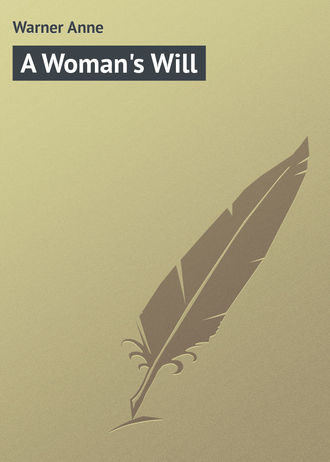
Warner Anne
A Woman's Will
“But if —if,” he emphasized the monosyllable with marked emphasis, – “if I asked you to marry me, what would you say?”
Rosina did not stop for an instant’s consideration.
“I should say ‘no.’”
He received the blow full in his face.
“Why?” he asked.
“I do not want another husband. I don’t like husbands. They are all alike.”
“How?”
“You can’t tell a thing about them beforehand; they always change, and are different after marriage from what they were before.”
“I shall never change,” he declared positively.
“They all say that.”
“But I speak truth!”
“They all say that too.”
“But with me it will arrive;” then he added, “with me it will arrive that I shall never change, because I shall never marry.”
His remark was such a complete surprise to her that she could hardly master her shock for a moment.
“If that was the point that you were leading up to,” she said finally, “I’m certainly glad that I did not say ‘yes.’”
He surveyed her, smiling.
“I particularly said ‘if,’” he reminded her; “I said, ‘if I asked you to marry me,’ you know?”
Rosina felt a strong inclination to bring the evening to a close. She wanted to be alone and think.
“We must go in,” she said.
“I also feel it,” he answered.
So they went in. The hall and staircase were quite deserted. He walked with her to the top of the first flight.
“Do we leave good-bye here?” he asked.
“Yes,” she said smiling; “I think so.”
He stood looking at her, and out of the depths of his nature various phantoms strove into shape.
“It is well that I go,” he said seriously; “after all, we are not children, you and I, and however we laugh it is always that, that we really are not children.” He put out his hand and took hers. “I shall be away, and the time will be long, and – ” he paused abruptly.
Her eyes almost closed beneath the unbearable heat of his gaze.
“Shall you remember me?” she asked, faintly this time.
“Yes, much.”
Then she opened her eyes and withdrew her hand.
“For how long?” she said as before.
He was still staring down at her.
“Who can say!”
“For three weeks? for four? for six?”
“Je ne sais pas,” he said briefly; “if I think too much I must come back, and that will not be wisely.”
“We must not stand here,” she said suddenly; “adieu, au revoir!”
“Yes,” he replied sombrely, “we must part now.”
He looked at her, and his eyes locked hers hard and fast for a long minute. She felt ill, faint, her breath seemed failing her. Then —
He seized her hand and pressed it so strongly against his lips that his lips parted and she felt his teeth against her flesh.
“Je vous aime!” he whispered, almost inaudibly. “Adieu!”
Part II
THE BEATING OF THE WAVES
Chapter Ten
IT was September in Munich. They stood together on the Maximilianbrücke, and, looking down into the gray and black turbulence of the Isar, felt themselves to be by contrast most tranquil and even-tempered. The little river rushed beneath them, forming a wealth of tiny whirlpools above its stone-paved way, its waters seeming to clash and struggle in a species of mimic, liquid warfare, and then, of a sudden, victor and vanquished fled wildly on together, giving place to other waves with their other personal scores to settle.
The banks on either side were beginning to show some touches of autumnal scarlet among those masses of vine whose ends trailed in the water below, and among the shrubs of the Promenade the same blood stain betrayed the summer’s death at the hands of the merciless frost king. The Peace Monument was there, piercing heaven with its golden wings; the Lucaskirche towered to the east; above them all sat the lofty Maximilianeum, that open-work crown of Munich, whose perfectly curved approach and double arcaded wings must joy the soul of every artist-nature that lingers near it.
“How old are you?” the man said suddenly.
Rosina jerked her consciousness up out of the bed of the Isar.
“No gentleman at home would ask a lady that,” she told him, thus showing great presence of mind.
He smiled and twisted his moustache.
“But I am not a gentleman at home,” he said pleasantly, “I am a gentleman travelling.”
“How old are you?”
“I have thirty-three years.”
“Well, I haven’t,” she said with decision; “you might think that I was forty, but that is only because I have had so much experience.”
He looked at her in a dubious, troubled way.
“I did not think that you had forty: I did not get that just perhaps. You have not truthfully forty, have you?”
Rosina laughed in unfeigned amusement.
“No, monsieur, I am not thirty even. I told you that if I seemed to be forty, it was because I had had so much experience.”
“So much experience?”
“Yes.”
“You feel that you have had experience?”
“I know it.”
“Experience as, par exemple, me?”
“Yes.”
He looked at her and smiled, shaking his head.
“Oh, madame, you say that, not at all knowing how much experience I have had.”
She raised her eyebrows slightly and turned to walk on. He followed at her shoulder, and when they came to the little stone stair that leads down to the Promenade, he halted and glanced expressively off among the paths and shade.
“There isn’t time,” she said, shaking her head now.
He went down two steps alone, and then held out his hand with that irresistible smile; she hesitated, looked helplessly around, and then, like all women who hesitate, was forthwith lost, swallowed up, in the maze of those wandering paths. Von Ibn secured his cane well beneath his arm and lit a cigarette.
“Do I ever now ask you ‘may I’?” he said.
“You never did ask me ‘might you?’” she replied.
He drew two or three satisfied puffs.
“It is good to be so friends,” he commented placidly, and then he took his cane into his right hand again and swung it with the peculiarly vigorous swing which in his case always betrayed the possession of an uncommon degree of bonne humeur. “And now for your experience?” he asked after a little. “It is that which I will to hear.”
“Did you ever go to a masked ball?”
“Mais, naturellement.”
“Well, so did I.” She paused to note the effect.
He threw a quick glance of undefined question at her.
“Masked?” he demanded.
“Oh, dear no! thickly veiled, and ’way upstairs in a gallery.”
“Were you greatly amused ’way upstairs in your gallery?”
“Yes, really; there were ever so many men there that I knew.”
“Did they come upstairs in the gallery?”
“No indeed, no one knew that I was there. But it interested me to see whom I knew – ”
“Was I there?” he interrupted.
“Oh, it wasn’t here! it was ever so long ago, while my husband was alive.”
“Did you see your husband?”
“Yes,” she said flushing, “and he was just like all the other men. He wore no mask, and he did not care one bit who might recognize him.”
“You had been better not gone,” said the man decidedly.
“Yes, I think so; I lost all my love for my husband that night, and killed all my faith in mankind forever.”
“Why did you be possessed to go?”
“I went because I did not want to be deceived in the way that many women are deceived.”
Von Ibn laughed.
“You know now all of everything, you think?”
“I know more than most other women do.”
“You would have known much more yet if you had worn a mask,” he told her very dryly.
She did not reply, and after a few minutes he continued:
“And now, when you know everything, and can no more be deceived, are you so most happy?”
“I do not know,” she said slowly.
“How have you lost your faith?” he inquired; “what in especial can no more deceive you?”
“I don’t believe in men,” she declared; “I don’t believe in anything that they say, nor in anything that they promise. And I don’t believe one bit in love!”
The man stopped by an empty bench.
“We have walked so long,” he remarked parenthetically; and she sat down, parenthetically also, so to speak.
“That is sad,” he said, digging in the gravel with his cane, “not to believe in love, or in the truth of a man! and you are a woman, too! Then there is no more truth and love for you.”
Rosina felt disheartened. A ready acquiescence in her views is always discouraging to a woman. What is the use of having views, if they are just tamely agreed to at once?
“I think perhaps men really mean what they say when they say it,” she began; “but, oh dear, they can’t stick to it afterwards. Why, my husband told me that my lightest wish should be his law, and then what do you think he did?”
“He did perhaps kiss you.”
“No, he went and bought a monkey!”
“What is a monkey?”
“Don’t you know what a monkey is?”
“If I know I will not trouble you to ask.”
“C’est un singe, – affe; now you know.”
“Oh, yes; I was thinking of a monk, and of how one told me that you had them not with you.”
Then he scraped gravel for a long time, while her mind wandered through a vista of monks and monkeys, and finally, entering the realm of the present day, paused over the dream of a hat which she had seen that morning in the Theatinerstrasse, a hat with a remarkably clever arrangement of one buckle between two wings; it was in the store that faced —
“I am an atheist,” said her companion, rising abruptly from his seat.
“Apropos of what?” she asked, decidedly startled, but rising too, – “apropos of the monkey?”
“Comment?” he said blankly.
“Nothing, nothing!” quickly.
They walked on slowly among the shadows which were beginning to gather beneath the trees; after a while he spoke again.
“I tell you just now that I am an atheist, and that is very true. Now I will make you a proposal and you shall see how serious I mean. I will change myself and believe in God, if you will change yourself and believe once more in men.”
“Can you believe in God or not just as you please?” she asked wonderingly.
“I am the master of myself,” he replied straitly; “if I say that I will pray to-night, I will pray. And you must say that you will believe,” he insisted; “you must again have a faith in men, and in their truth, and in honor.” Then he paused lengthily. “And in love?” he continued; “say that you will again believe in love? – you will, will you not? yes?”
“I don’t know that I can do it, even if I want to,” she said musingly; “looking on at life is so terribly disheartening, especially with us in America, you know.”
“Oh,” he said quickly, “but I do not want you to believe in love in America; I talk of here in Munich.”
“I suppose you mean yourself?”
“Yes,” he said most emphatically, – “me.”
She could not help laughing a little.
“You do really amuse me so much,” she apologized.
A workman in a dirty blouse and a forlorn, green Tyrolese hat, the cock’s plume of which had been all too often rained upon, passed close beside them. Von Ibn, nothing daunted, seized her gloved hand and pressed it to his lips; she freed it quickly and swept all their environage with one swift and comprehensive glance.
“If any one that knew us should see you!” she exclaimed.
He calmly gazed after the now distant workman.
“I did not know him,” he said; “did you?”
Then she was obliged to laugh again.
“You are always so afraid of the world,” he continued, remonstrating; “what does it make if one do see me kiss your hand? kissing your hand is so little kissing.”
He paused a moment and smiled whimsically.
“I did really laugh alone in my room the other night. I sit there smoking and thinking what a bad fright you have always when I will to take your hand and kiss it – you fear ever that some one shall not be there to see. Then I think, if I would give you a true kiss, that would be to your mind so awful, – the fear of a seeing, you know, – that we must then go in a cellar and bolt nine doors first, probably.”
He laughed, but she did not.
“When I go into a cellar with you,” she said coldly, “and allow nine doors bolted, you may kiss me, and I pledge you my word not to scream.”
A dead silence followed her remark, and lasted until Von Ibn broke it, saying abstractedly:
“One does go underground to visit the breweries;” after which he meditated some while longer before adding, “but they never would bolt the doors, I think.”
Rosina felt any comment on these words to be unnecessary and continued upon the even tenor of her way. They were close by the Luitpoldbrücke now, and she went towards the bridge, which lay upon their homeward route. Von Ibn followed her lead placidly until they were upon the opposite bank, when he suddenly halted.
“Have you lost something?” she asked, stopping also.
“No, but I asked you some question just now and you have never reply.”
“What was it?”
“About believing.”
“But I am going so soon,” she objected.
“How soon?”
“In December.”
“It is then all settled?” he inquired, with interest.
“Yes.”
“But you can unsettle it?” he reminded her eagerly.
“I don’t want to unsettle it – I want to go.”
He stared at her blankly.
“How have I offended you?” he asked after a while.
“You have not offended me,” she said, much surprised.
“But you say that you want to go?”
“That is because I feel that I must go.”
“Why must you go? why do you not stay here this winter? – or, hold! why do you not go to Dresden? Later I also must go to Dresden, and it would be so gemüthlich, in Dresden together.”
“It will be gemüthlich for me to get home, too.”
“Do you wish much to go?”
“Yes; I think that I do.”
Then she wondered if she was really speaking the truth, and, going to the edge of the bank, looked abstractedly down into the rapid current.
“What do you think?” he asked, following her there.
She turned her face towards him with a smile.
“I cannot help feeling curious as to whether, when I shall really be again in America, I shall know a longing for – for the Isar, or not?”
“I wonder, shall I ever be in America,” he said thoughtfully; “and if I ever should come there, where do you think would be for me the most interesting?”
“Chez moi,” she laughed.
He smiled in amusement at her quick answer.
“But I shall never come to America,” he went on presently; “I do not think it is a healthy country. I have an uncle who did die of the yellow fever in Chili.”
“There is more of America than Chili; that’s in South America – quite another country from mine.”
“Yes, I know; your land is where the men had the war with the negroes before they make them all free. I study all that once and find it quite dull.”
“The war was between the Northern and Southern States of North America – ” she began.
“Ça ne m’intéresse du tout,” he broke in; “let us walk on.”
They walked on, and there was a lengthy pause in the conversation, because Rosina considered his interruption to be extremely rude and would not broach another subject. They went a long way in the darkness of a heavily clouded September twilight, and finally:
“Where did he buy it?” he asked.
“Where did he buy what? where did who buy what?”
“The monkey.”
“Oh! I don’t know, I’m sure.”
Then there was another long silence.
“To-morrow,” he announced, “I am going to the Tagernsee, and – ”
“I’m not,” she put in flatly.
He turned his head and stared reprovingly.
“How you have say that! not in the way of good manners at all.”
“No,” she said, with an air of retort, “I am with you so much that I am beginning to forget all my good manners.”
“Am I so bad mannered?”
“Yes, you are.”
“How?”
“You interrupt, and you are frank to a degree that is always impolite, and sometimes really awful.”
“And you,” he exclaimed eagerly, “how bad you also are! you never even try to be agreeable, and when I speak with great seriosity you are often more amused than before, even.”
Rosina tried to look sorry, but found it safer, even in the twilight, to look the other way.
“The truth is,” he went on vigorously, “I am very much too good with you! I have never taken my time to an American before, and I am always fearful. I have been a fool. I shall not be a fool any more.”
“How do you intend to begin to grow wise?”
“You will see.”
The threat sounded dire, but they were now at the corner by the Maximiliansstrasse, and supper was too near for her to feel downcast.
“I hope that we are to have potato salad to-night,” she said cheerfully.
He continued to meditate moodily.
“Oh, we are much too much together,” he announced at last.
“Well,” she replied, “if you go to the Tagernsee to-morrow that will give us a little mutual rest.”
“I may miss the train,” he added thoughtfully; “if I do – ”
“You can take the next one,” she finished for him.
He looked at her witheringly.
“If I do miss the train, I will carry my violin to you and we will make some music in the evening.”
Rosina stopped, fairly paralyzed with joy.
“Oh, monsieur,” she cried, “will you really?”
“Yes, that is what I will; if I miss the train.”
They had entered beneath the long arcade, which was dark and altogether deserted except for one distant figure.
“I almost want you to miss your train,” she said eagerly. “You do not know how very, very anxious I am to hear you play.”
“I can miss it,” he said thoughtfully; “it is very simple to miss a train. One can sleep, and then here in Munich one may say the cabman a wrong Gare. If I say ‘Ostbahnhof’ when I must go from the Starnberg, I shall surely miss the train, you know.”
He looked at her gravely and she burst out laughing at the picture he had drawn for her mind, because there is all of three or four miles between those two particular stations.
“But I don’t want you to miss the train,” she said presently. “You can play for me after you come back, I – ”
At this moment the figure which had been coming towards them suddenly resolved itself into that of a stalwart young man, who, just as he was directly in front of them, stopped, seized Rosina in his arms and kissed her. She very naturally screamed in fright, and her escort delivered a blow at the stranger which sent him reeling backwards against one of the stone pillars.
The man, who was well dressed and appeared to be a gentleman, recovered himself with surprising quickness, and laughed oddly, saying:
“My Lord, what a welcome!”
At the sound of his voice Rosina screamed afresh, this time in quite another tone, however, exclaiming:
“It’s my cousin Jack!”
“It is your – some one you know?” stammered Von Ibn. “Then I must demand a thousand pardons.”
“Not at all,” said Jack, taking his hand and shaking it heartily; “that’s all right! don’t say a word more. The trouble was that when I saw Rosina I forgot that she had gotten out of the habit of being kissed. Of course I scared her awfully. Are you over it yet, dear?”
Rosina stood between the two men, and appeared completely stunned by her cousin’s arrival.
“Where did you drop from, anyhow?” she asked, finding her tongue at last.
“Came over to go back with you; left Paris last night.”
“Where will you stay? There isn’t an empty corner in the pension, one has to write ever so long ahead.”
“I’m going to stay at the Vierjahreszeiten, just beside you. I’m all right.”
“Yes,” said Von Ibn suddenly, “you are very right; I stay there too.”
Rosina thought despairingly, “They’ll see a lot of one another, and Jack will dislike him and he’ll hate Jack.”
By this time they were come to her door and paused there.
“I’m going in with you,” the cousin said. “Madame was so glad to see me again that she wanted me to come back and sit next to her at supper. I was awfully glad to see her. She’s even younger and prettier than when I last saw her – when you and I were kids there that winter, don’t you remember?”
Von Ibn was staring sombrely at Rosina and she was sure that Jack would notice it, and wished that he wouldn’t. Then he gave a little start and held out his hand.
“I shall not come to-night,” he said, “and to-morrow I go to the Tagernsee; so it is ‘good-bye’ here.”
She felt choked.
“Good-bye,” she said, keenly aware of being watched, but striving to speak pleasantly notwithstanding. He shook her hand, raised his hat, and left them.
Then her cousin swung the big porte open and they entered the passage and went towards the stairs. At the first step he paused and said in a peculiarly pointed tone of voice:
“Well, are you going to marry him?”
She jumped at the suddenness of the question, and then, recovering herself quickly, answered coldly:
“Of course not.”
“Why of course not?”
Her neck took on a quite new poise – not new to the man behind her, however.
“I asked you, ‘Why of course not’?” he repeated.
“You know how foolish such a question is.”
“It isn’t foolish. Yourself considered, it’s the most natural question in the world.”
“You never met me before when I was walking with a stranger, and then asked me such a thing.”
“This man’s different. Some one wrote home that you were going to marry him. You can imagine Uncle John! I was sent for from the beach and shipped by the first thing that sailed after my arrival.”
Rosina stopped on the first landing to stare in tranceful astonishment.
“Some one wrote!” she ejaculated faintly. “Who wrote?”
“Never you mind who wrote. Whoever it was set uncle thinking, and I was posted off to look him up.”
“When did you come over?”
“Landed in Hamburg the last of August.”
“Where have you been ever since?”
“Been looking him up.”
Rosina began to mount the second staircase; she appeared completely bewildered.
“It’s very nice of uncle,” she said about the fourth step, “and of course I’m awfully obliged to whoever wrote home; but I’m not going to marry him, really.”
Jack whistled.
“Well,” he said cheerily, as they attained the second landing, “I know all about him now, anyway; and if you ever do want to go ahead, you can be sure that he’s all right.”
“I knew that he was all right,” she said quietly; “every one in Europe knows that he’s all right.”
“He’s a first-class boxer, anyhow,” the cousin declared. “Lord, what a blow that was! And I did not mean to frighten you at all, either; I thought that you saw me coming.”
“How was I to know that it was you? I supposed that you were in New York. I did not think that there was a man on this continent who had a right to kiss me. And even if there was I shouldn’t be expecting him to do so in public. You never kissed me in the street yourself before. What possessed you to do so this time?”
She faced about on the stairs as she spoke, and he stopped and drew a deep breath or two. It takes time to become acclimated to the stairs abroad.
“Don’t be vexed at me,” he implored, “or I shall think that you are not glad that I came; and you are, aren’t you?”
“Yes, of course I am.”
“And after supper to-night we’ll go out and take a good old-fashioned tramp and talk a lot, won’t we?”
They were now before the door of the pension and he was pressing the electric bell. She sighed a resigned sigh of utter submission, nodded acquiescently, and waited beside him.
Anna, a maid whose countenance left much to be divined at pleasure, finally let them in. When she saw that the lady had changed her escort, her face fell and she slightly shook her head as if regretful that one who was so generous should own openly to the vice of fickleness. They went into the long hall and Jack paused to hang his hat upon one of the hooks in that angle by the door; then he overtook his cousin and they went together to the salon, the pretty little salon with its great window, tall white-tiled stove, piano, corner-ways divan, tabouret, table of magazines, quaint Dutch picture of Queen Wilhelmina, and the vase in the corner – that green vase from whose stem hangs the flower-like body of a delicate porcelain nymph.
“You can’t smoke here, you know,” she cautioned him. “If you want to smoke you must go into the corridor.”
“I don’t want to smoke,” he said. “I’ll look out of the window. I like to watch the people.”
So she left him there and sought Ottillie.
After supper that night they did go to walk; and if Rosina’s cousin came abroad with a mission he certainly went in for fulfilling it vigorously.
“Who wrote you about him, anyhow?” she demanded at last, when her patience was nearly exhausted by the mercilessness of his cross-examination. She was inwardly furious at whoever had done so, but it seemed wisdom to conceal her fury – for the present at least.
“You can’t travel about all summer with the same man everlastingly at your heels, without other people’s seeing him as well as yourself.”
“But some one person must have written. It can’t be that several people would bother to.”
“You won’t ever know who wrote, so don’t you fret.”
They were crossing the Max-Joseph Platz diagonally, and a light flashing from a passing trolley seemed to suddenly illuminate her brain.
“I bet I do know,” she cried.
“I bet you don’t.”
“It was a man; now wasn’t it?”
“Yes, it was a man; but I won’t say a word more.”
She smiled, triumphant in her woman’s intuition.
“It was that man at Zurich,” she exclaimed; “wasn’t it?”
He turned into the Residenzstrasse and made no reply.
“It was, wasn’t it?” she insisted.
“I shan’t tell.”
“You needn’t tell. I know that it was and you know that it was too, so I’m satisfied.”
They went along past the two sentinels who guard the gate of the royal palace, and emerged on the large open space that spreads before the Feldherrnhalle. From there the Ludwigsstrasse stretches straight out and away to the Siegesthor, stretches in one magnificent splendor of breadth and boulevard and electric lights. They took the right-hand side and set off at a pace neither swift nor slow – just such a pace as will allow sufficient breath for ample conversation.
“You know you’ll marry again, Rosina, no matter what you may say; you know that, don’t you?”
“No, I don’t.”
“Nonsense!”
“Well, I’m sure that I won’t for a long time.”
“Of course you can’t until the two years are out, but they’re out this October; and you know the more dead-set you are against doing anything the surer you are to do it. We all know that just by the light of the past.”
She elevated her eyebrows and made no reply.
“You’ve got so much money that naturally we couldn’t hear that any one was following you continually, without wanting to know what he was after. I should think you could see how that would strike Uncle John.”
“Monsieur von Ibn doesn’t mean to marry any more than I do,” she declared positively.
“Doesn’t he? How do you know?”
“He told me so himself.”
“When?”
“Ever so many times.”
He laughed and stopped to examine one of the posters of the “Elfscharfrichters,” – the one of the cadaverous lady all in black, with her hands outspread.
“What interests you in him, anyhow?” he asked after a little.
“Can’t a woman enjoy being with a man without wanting to marry him? I like him because he’s so original.”
“He’s original all right,” Jack reflected; “that’s very, very true. He’s the first man who ever thought of knocking me down for kissing you.”
“It was because I screamed. Why didn’t you write that you were coming?”
“I wanted to arrive unexpectedly and see for myself.”
“Well, did you see?”
He chuckled.
“Yes, and felt too. He doesn’t intend that any one else shall kiss you.”
Rosina whirled, her eyes sparkling with anger.
“I’ll never forgive you if you say another thing like that,” she cried hotly.
The cousin judged it advisable to suggest diverging from the Ludwigsstrasse, and extending their promenade in the direction of the Wittelsbach Palace. Dark streets have a naturally subduing effect, and he knew what an upheaval his arrival had produced even better than she did.
They went towards the Caserne, and were in the Améliesstrasse before either began another subject. And even then it was really not a new one, because Jack, having a definite end in view, could not lose sight of it for a minute.
“Why do you think that you don’t want to get married again?” he said, courageously returning to the fight.
“I don’t think anything about it. I know that I don’t want to get married again!”
“Von Ibn seems to be a mighty nice sort of a fellow. I’ve met ever so many people who told me lots about him. He’s got quite a property for these men over here, and he’ll have two jolly places and a title, too. And the family won’t kick over his marrying any one; they’ve been at him to get married for years and years. He’s the only son, you know.”
“All right,” she said dryly.
“Have you anything personal against him?”
“No; but I know that I can see all that I want of him without marrying him; and as long as we do not get married we have the delightful privilege of being able to separate the instant that we grow tired of one another. And the ability to stop when you’ve had enough is a great thing.”
“Has he bored you any yet?”
“Not yet. Oh, Jack, you ought to hear him talk. He said yesterday that we must go somewhere early before the cool grew too hot.”
Jack regarded her sympathetically.
“I’d certainly marry him,” he said, with decision. “If he can say things like that offhand, only think what he’d be to live with day after day.”
Rosina was silent for a moment, and then she gave a violent shiver.
“Oh,” she exclaimed, in a voice that echoed like a low cry, “I don’t believe that I ever can marry again – it’s so terrible!”
Jack took her hand and drew it closely within his arm.
“Don’t say that,” he said earnestly. “Every one knows that you didn’t have a fair show first time. Your husband was – Well, you know what he was.”
“I should say that I did know what he was.”
“I always wondered if you just wanted to get your hands on a big establishment.”
“Oh, what makes you say such things? You know that I was desperately in love with him – as much so as a girl can be.”
“Do you feel anything like it again now?”
She shook her head.
“No, indeed; I feel that I may get tired of monsieur any day.”
They turned down towards the Ludwigsstrasse and Rosina appeared to be thinking deeply. At last she spoke, and her accents were firm as granite.
“I do not believe that I ever could marry again.”
Jack shrugged his shoulders.
“There’s no string on you,” he declared lightly.
The next morning, as the lady was stirring her whipped cream into her chocolate, Ottillie entered with a note:
“Dear Rosina, – Von Ibn and I are leaving for the Tagernsee by the early train. Think we’ll be gone four or five days.
“Always yours,
“Jack.”







